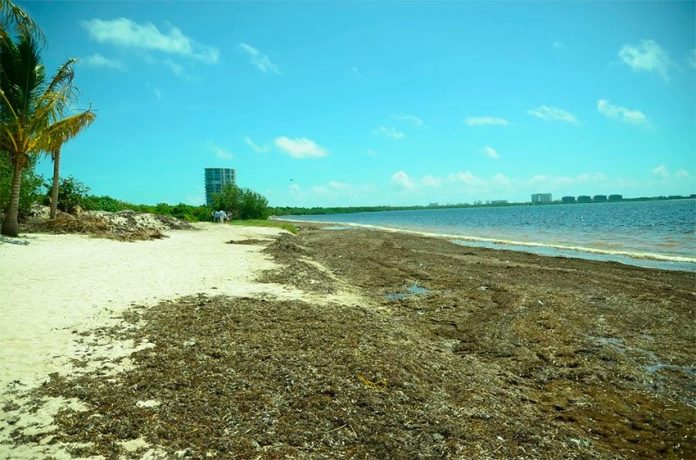Massive amounts of sargassum are expected to wash up on Caribbean coast beaches in the coming days and weeks.
According to the Sargassum Early Warning System, a significant quantity of the seaweed is currently approaching Quintana Roo and is predicted to affect 500 kilometers of coastline from Isla Blanca north of Cancún to Xcalak in the extreme south of the state.
Cancún, Isla Mujeres, Puerto Morelos, Playa del Carmen, Cozumel, Tulum and Mahahual are among the destinations that are expected to see large amounts of sargassum over the weekend.
In Cancún, municipal authorities predict that 1,620 cubic meters will invade the city’s beaches this month.
That amount would be almost triple the 600 cubic meters that arrived last month and more than five times the quantity that washed up in April. Authorities responsible for collecting the sargassum, including the navy and the federal Secretariat of the Environment, are already struggling to keep beaches clean.
Lenin Amaro Betancourt, president of the Riviera Maya Real Estate Professionals Association, estimated that the arrival of sargassum this year has already cost the economy US $200 million and predicted that as many as 2,500 jobs could be lost as a result of the downturn in tourist numbers.
With their livelihoods under threat and faced with the inability of authorities to cope with the large quantities of sargassum arriving on Quintana Roo beaches, hotel owners in the state are implementing their own measures to combat the unsightly and smelly seaweed.
In Puerto Morelos, 15 hotel owners started an anti-sargassum initiative that has now caught the attention of the United Nations.
Under the Puerto Morelos Protocol, a diversion barrier has been installed off the coast that prevents 75% of sargassum reaching the beach and an industry that makes use of the seaweed has been developed.
Hotel owner Carlos Gosselin Maurel said the United Nations is interested in implementing the strategy in other Caribbean countries whose coastlines are plagued by sargassum.
Gosselin already met once with UN officials and will attend another meeting this month with the organization’s Caribbean-based representatives.
“We have to speak with the Barbados ambassador to the UN, who deals with Caribbean problems, and in that way we’ll be able to export the [anti-sargassum] protocol . . .” he said.
Source: Milenio (sp), Sipse (sp), Turquesa News (sp)
